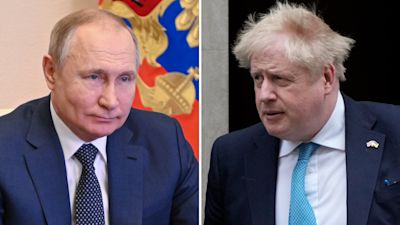MPs back economic crime reforms as action urged on seizing Russian oligarchs’ assets

More sanctions were announced on Monday but critics say they do not go far enough, reports ITV News Political Editor Robert Peston
New laws designed to tackle “dirty money” hidden in the UK have cleared the House of Commons, amid calls for ministers to go further on seizing oligarchs’ assets.
The Economic Crime (Transparency and Enforcement) Bill received an unopposed third reading after it was rushed through the Commons on Monday.
Reforms contained in the Bill have faced months of delays and only moved up the government’s list of priorities following Russia’s invasion of Ukraine.
They will undergo further scrutiny in the House of Lords, with business minister Paul Scully committing the government to making further amendments to deal with concerns over potential loopholes in the Bill.
These include on dealing with what Conservative former leader Sir Iain Duncan Smith labelled a “back door” to those hoping to avoid reporting requirements under the new register of overseas entities.
The legislation is set to establish a new register of overseas entities requiring foreign owners of property in the UK to declare their true identity.
The register would need to be updated each year and punishments for failing to declare details, or submitting false information, would result in the asset being frozen and it cannot be sold or rented out.
The Bill states an offence is committed if a person acts “knowingly or recklessly” when submitting false information to the register, although Sir Iain and others warned this could set the threshold too high and not result in any court action.
Listen to ITV News' podcast for the latest analysis on the Ukraine war:
It comes after Prime Minister Boris Johnson added his voice to calls to wean Europe off Russian energy in order to further squeeze Moscow's finances.US Secretary of State Antony Blinken said over the weekend that Washington was in “very active discussions” with European allies over energy sanctions amid calls from Ukrainian President Volodymyr Zelensky for tougher action.
His comments saw gas prices surge by more than 70% to a new all-time high, while the cost of oil reached its highest level for 14 years.
But following talks in Downing Street with the prime ministers of Canada and the Netherlands, Mr Johnson called for a “step-by-step” approach as European countries weaned themselves off Russian hydrocarbons.
In the UK, he said ministers were looking at the possibility of using more oil and gas from British sources – although he insisted this did not mean abandoning its commitment to reducing carbon emissions.
When the Ukrainian president addresses MPs on Tuesday, he's likely to call for tougher measures, including a no-fly zone, says Political Editor Robert Peston
“It is completely the right thing to do to move away from dependence on Russian hydrocarbons, but we have to do it step by step,” Mr Johnson told a joint news conference.
“We have got to make sure we have substitute supply. One of the things we are looking at is the possibility of using more of our own hydrocarbons
“That doesn’t mean we are in any way abandoning our commitment to reducing CO2, but we have got to reflect the reality that there is a crunch on at the moment. We need to increase our self-reliance.”
Dutch premier Mark Rutte warned that if countries moved too quickly to ban Russian oil and gas, it could backfire with “enormous consequences”.
He added: “Here we should not make a mistake. We have to make sure that they don’t generate unmanageable risks to energy supply in European countries and beyond, including Ukraine.”
Mr Johnson described the Russian president's tactics as "repugnant" and vowed that additional sanctions against Moscow would be implemented.
“The president of Russia is plainly doubling down," he said during the conference, which included the Canadian Prime Minister Justin Trudeau and Dutch Prime Minister Mark Rutte. “He has decided that he is going to continue with an all-out onslaught on centres of habitation in a way that we think is utterly repugnant. “It’s clear that we’re going to have to do more.”
Further sanctions were also revealed at the press conference, with Mr Trudeau announcing fresh measures against 10 individuals "complicit" in the "unjustified invasion" of Ukraine.
The announcements came on the twelfth day of the bloody Russian war in Ukraine, which has seen 364 Ukrainian civilians killed so far, according to the UN human rights office. However the true death toll is expected to be far higher.
Russian forces are reported to have continued to hit some areas with rockets, despite the announcement of humanitarian corridors being set up to allow civilians to flee besieged Ukrainian areas.
Rescuers said they were extinguishing fires in residential areas after soldiers opened fire on the city of Mykolaiv, some 298 miles south of the capital of Kyiv, Ukraine’s General Staff said on Monday.
The deteriorating security situation has heightened the urgency to assist those trying to flee Ukraine, with Mr Johnson acknowledging the UK government needs to do “even more” to help refugees after criticism that a low number of visas had been approved.
On Monday, the Home Office confirmed more than 17,700 visa applications had been made, of which 300 had been granted so far.He said the UK will give £175 million of aid to Ukraine, saying it takes its total commitment to nearly £400 million.